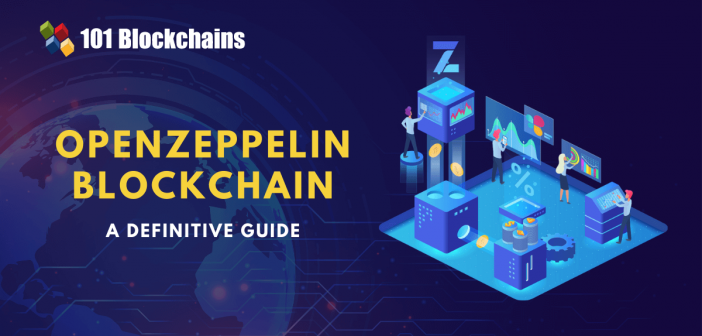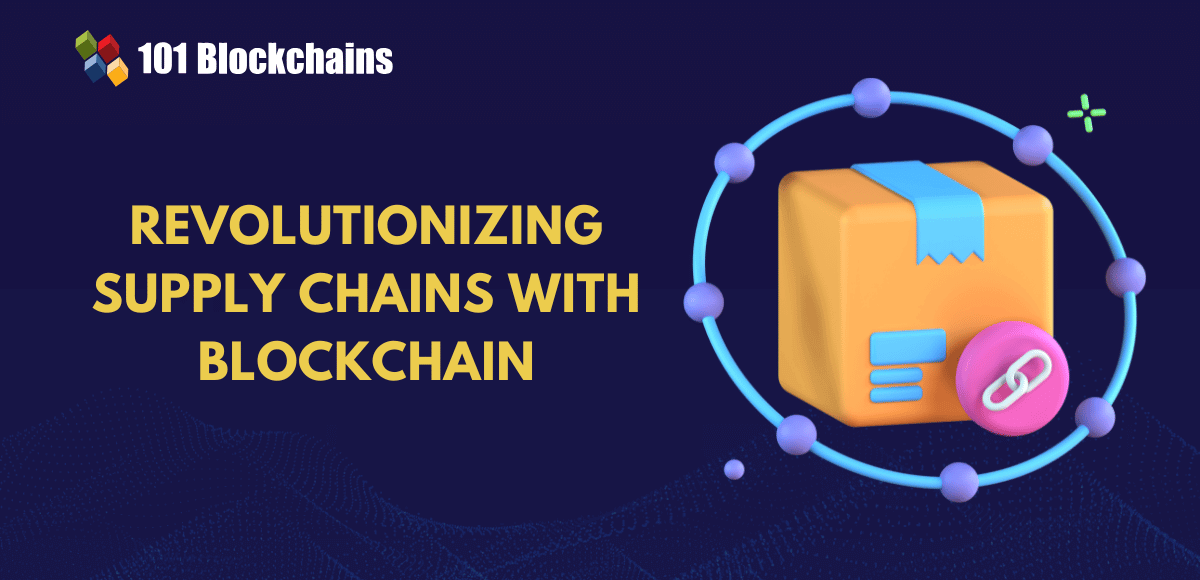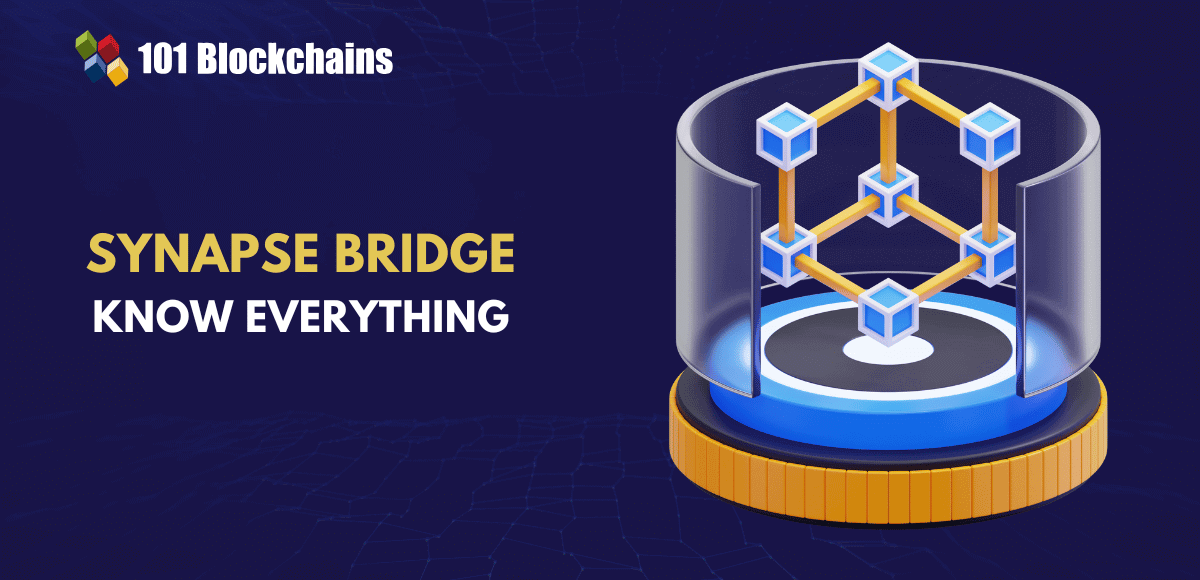Learn how blockchain truly works, master key definitions, and uncover what makes smart contracts so "smart." Dive into the fundamentals, gain valuable insights, and start your blockchain journey today!

- Blockchain
Georgia Weston
- on January 17, 2022
A Beginner’s Guide to OpenZeppelin Blockchain
Are you familiar with the term OpenZeppelin blockchain? Learn more about the OpenZeppelin blockchain in this beginner’s guide.
Blockchain introduced the world to a new promise of decentralized systems, applications, protocols, and organizations. After more than a decade of gaining mainstream recognition, people are discussing blockchain as a general topic in technology. Many blockchain-based solutions such as Bitcoin, Ethereum, and most recently, DeFi and NFTs, have turned into notable highlights worldwide.
Among the many blockchain protocols, you could also come across the term “OpenZeppelin”, and there are many promising reasons to learn about it. It is basically a security platform for DeFi and NFT projects. The following discussion helps you discover more about the OpenZeppelin blockchain and how it is relevant for the emerging advancements in crypto.
Build your identity as a certified blockchain expert with 101 Blockchains’ Blockchain Certifications designed to provide enhanced career prospects.
What is OpenZeppelin in Blockchain?
One of the foremost questions troubling your mind about OpenZeppelin would obviously point towards its definition. It is a security operations platform featuring diverse functionalities for security. The common answer for “what is OpenZeppelin in blockchain?” would showcase it as an open-source framework tailored for developing secure smart contracts.
Basically, the tool can help smart contract developers focus on deployment rather than worrying about the development of dedicated security tools. As a result, developers could reduce the time required for shipping their products alongside resolving the concerns of security risks.
Generally, developers have to build the security features offered in OpenZeppelin according to the application. However, developers could not find any existing tools for supporting their collaboration in the development, review, and audit of smart contracts. Therefore, you can also consider OpenZeppelin as a security audit for smart contract developers, which can reduce the potential risks associated with different DeFi projects.
Get familiar with the terms related to blockchain with Blockchain Basics Flashcards.
Reasons for Introducing OpenZeppelin
The next important question after “What is OpenZeppelin in blockchain?” would refer to the reasons for introducing the tool. People who follow the crypto and DeFi space closely must have come across news of some popular cyber-attacks on DeFi protocols.
For example, the YAM Finance bug ended up costing the company a whole new version of their application. The promising potential associated with the DeFi landscape can drive developers to ship DeFi solutions without focusing on security. The consequences of such actions could make increase the vulnerability of users’ funds.
Another important reason for understanding more about the OpenZeppelin wizard would refer to the new attack vectors in DeFi. Rather than going for direct economic attacks, hackers are focusing on the exploitation of arbitrage opportunities. For example, hackers have used flash loans for manipulation of price bids in notable cases such as the bZx hack and the Harvest Finance hack.
Hackers successfully manipulated the prices in favor of their trades. Even if Harvest Finance deployed an open-source code alongside a detailed code review by security auditing firms, it featured one vulnerability. Harvest Finance utilized the automated market maker of Curve as a price oracle which turned into a major vulnerability.
However, the identification of new risks and vulnerabilities in DeFi protocols continues to foster the prospects for OpenZeppelin blockchain. It aims at offering a credible resource for smart contract audits and other security functionalities for developers. So, it is quite important to find out what OpenZeppelin has under its hood.
Is OpenZeppelin a Contract?
Many beginners learning about OpenZeppelin might harbor assumptions suggesting that it is a smart contract. On the other hand, it is important to dive into the components involved in it. A detailed understanding of the different components could help you find clarity on “Is OpenZeppelin a contract?” with ease. You can discover that it is a platform that offers a wide range of security products. The security products support development, management, and review of various aspects in software development and operations in Ethereum-based projects.
Pillars of OpenZeppelin Blockchain Connection
The three strong pillars of OpenZeppelin blockchain connection include Contracts, Upgrades, and Defender. Let us try to discover the relevance of these elements in the working of an innovative blockchain security platform.
1. Contracts
You can find the best answer for “Is OpenZeppelin a contract?” by reflecting on the “Contracts” library offered on the platform. It is basically a library that facilitates the necessary instruments for developing smart contracts with high security. The most important highlight of the “Contracts” library is the backing of a solid foundation for smart contract development through community-reviewed code. The OpenZeppelin library offers the following functionalities for smart contract developers.
- Implementation of ERC-20 and ERC-721 standards.
- Role-based permissioning scheme with higher flexibility.
- Reusable Solidity components for developing complicated decentralized systems and custom contracts.
The OpenZeppelin Contracts also offers additional functionalities, including access control, utilities, and tokens, thereby showcasing the comprehensiveness of the OpenZeppelin library. You can leverage the Access Control functionality in the library for defining the authority for actions on a specific system.
You could also access the generic productive tools with utility functionality in the library. Some of the useful tools in Utilities include trustless payment systems, non-overflowing math, and signature verification. Furthermore, you could also use the library for creating OpenZeppelin ERC20 standard collectibles or tradable assets.
The stable API in OpenZeppelin contracts ensures reduced risks for unexpected errors in contracts during upgrades to newer minor versions. On top of it, comprehensive documentation of the full API offers a promising reference for smart contract application development.
Curious to understand the complete smart contract development lifecycle? Join Yearly/Yearly+ Plan and get free access to the Smart Contracts Development Course Now!
2. Upgrades
Another interesting addition in the OpenZeppelin library that enhances its functionality would refer to “Upgrades.” It is basically a comprehensive collection of tools and contracts for deploying and managing upgradeable contracts on Ethereum. At the same time, it also provides assurance for the security of smart contracts during the upgrade process. The collection of tools and contracts in the “Upgrades” component of OpenZeppelin include the following,
- Upgradeable Plugins
Upgradeable plugins are suitable instruments for deploying upgradeable contracts alongside the value of security checks with high automation. They are basically helpful in the OpenZeppelin blockchain for the integration of upgrades in the existing workflow. You can find Truffle and Hardhat plugins for deploying and managing upgradeable Ethereum-based contracts. The upgradeable plugins can help you deploy the upgradeable contracts and upgrade the deployed contracts. In addition, they also allow better ease in management of proxy admin rights alongside enabling easier use of contracts in tests.
- Upgradeable Contracts
Upgradeable contracts are an essential component in the OpenZeppelin wizard as it supports contract development by leveraging Solidity components. It is reasonable to assume that it is another version of the popular OpenZeppelin library for “Contracts.” If you need the upgradeable plugins, then you need to use the upgradeable contracts, available as a special package. Upgradeable contracts library complies with all the rules associated with upgradeable scripting contracts.
It has introduced initializer functions in place of constructors alongside ensuring the initialization of state variables in initializer functions. Furthermore, the platform also looks for any possible storage incompatibilities throughout minor versions. You could also discover proxy contracts in OpenZeppelin upgradeable contracts, which offer a detailed list of proxy contracts and utilities. The proxy contracts also feature documentation suitable for low-level use without any upgrade plugins.
Excited to learn the basic and advanced concepts of ethereum technology? Enroll Now in The Complete Ethereum Technology Course
3. Defender
The true identity of OpenZeppelin in blockchain landscape becomes clearly evident with the Defender component. Defender offers the security operations platform with in-built best practices and serves as the major highlight of OpenZeppelin. Developer teams could utilize Defender for shipping their products faster and reduce the security risks.
It helps in the automation of your Ethereum operations for delivering high-quality products within lesser time. The components of Defender have a huge role in defining its capabilities for smart contract security. Here is an overview of the distinct components you can find in OpenZeppelin Defender.
- Admin
The Defender Admin is basically a service for offering an interface that can support the efficient management of smart contract projects. Defender Admin leverages timelocks and secures multi-sig contracts for offering the interface. In addition, Defender Admin does not exert any control over the concerned system. As a matter of fact, the keys of the signers fully control the system. The Defender Admin in OpenZeppelin blockchain works effectively for secure on-chain management of smart contracts
- Relay
The Defender Relay in OpenZeppelin wizard offers a service that enables users to send transactions through a general HTTP API. Furthermore, Defender Relay also covers the requirements in transaction signing, resubmissions, and private key secure storage. It also supports the functionalities of gas price estimation and nonce management. As a result, developers don’t have to harbor any concerns about securing private keys in backend scripts or monitoring transactions. Defender Relay is the best choice for smart contract codes which involve a hot wallet.
- Sentinel
Another important highlight of OpenZeppelin Defender would point towards its Sentinel service. It serves the basic function of monitoring smart contracts and sending notifications. You can identify two distinct variants of Sentinels in the Defender Sentinel service. The Contract Sentinels help in monitoring transactions with a contract through defining specific conditions for functions, events, and transaction parameters. The Forta Sentinels help in monitoring Forta Alerts through the definition of specific conditions for alert IDs, Forta Agents, severity, and contract addresses.
Curious to learn about blockchain implementation and strategy for managing your blockchain projects? Enroll Now in Blockchain Technology – Implementation And Strategy Course!
- Autotasks
The Defender Autotasks is also one of the crucial aspects required for creating and managing OpenZeppelin ERC20 tokens. It helps in running code snippets on a regular basis by leveraging webhooks or as a response to specific transactions. Autotasks help in automating regular actions with the support of integration to Sentinels and Relay services of Defender. Autotasks are a favorable choice for developers who need to run recurrent actions on their smart contracts.
- Advisor
The final and most productive component in the OpenZeppelin library would refer to the Defender Advisor service. You can discover a knowledge base of security best practices with Defender Advisor. Interestingly, the OpenZeppelin team has curated the knowledge base of security best practices in Defender Advisor. The best practices outlined in the service cover different areas such as development, operations, monitoring, and testing.
You can also use the service as a checklist for prioritizing efforts in the implementation of project security. The Defender Advisor can serve as helpful resources for evaluating security and prioritization of additional best practices. Most important of all, it can provide a viable platform for empowering knowledge on security training.
Aspiring to make a lucrative career as a blockchain developer but not sure how? Check the detailed guide Now on How To Become Blockchain Developer?
Bottom Line
The problems associated with security did not find a full stop with the introduction of blockchain. Irrespective of the basic emphasis on security, blockchain-based projects such as DeFi protocols have been subjected to exploitation on many accounts. As the world gears up for mainstream DeFi adoption, the introduction of a tool like OpenZeppelin presents many favorable opportunities. The security operations platform aims to offer a proven solution for auditing smart contract code for security risks.
Interestingly, the platform also offers tons of resources for developing, managing, and upgrading smart contracts. You can create OpenZeppelin ERC20 standard tradable assets and collectibles and access plugins for upgrading smart contract applications. The platform focuses on the long-term objective of creating a truly trustless DeFi ecosystem. With the opportunities for comprehensive verification of smart contracts and automation, developers could discover promising improvements in productivity. Learn more about OpenZeppelin and how to use it for developing your own smart contract.
*Disclaimer: The article should not be taken as, and is not intended to provide any investment advice. Claims made in this article do not constitute investment advice and should not be taken as such. 101 Blockchains shall not be responsible for any loss sustained by any person who relies on this article. Do your own research!





